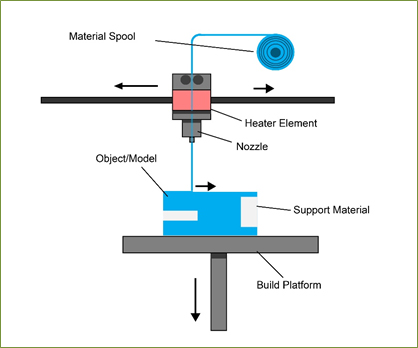Fused Deposition Modeling (FDM)
Additive manufacturing, or 3D printing, has been a popular method of creating prototypes since the 1980s and is quickly becoming the fastest, most affordable way to create custom consumer goods, as well.
There are several different methods of 3D printing, but the most widely used is a process known as Fused Deposition Modeling (FDM). FDM printers use a thermoplastic filament, which is heated to its melting point and then extruded, layer by layer, to create a three dimensional object.
Fused deposition modeling (FDM) is an additive manufacturing technology commonly used for modeling, prototyping, and production applications. It is one of the techniques used for 3D printing.
FDM works on an "additive" principle by laying down material in layers; a plastic filament or metal wire is unwound from a coil and supplies material to produce a part.
The technology behind FDM was invented in the 1980s by Scott Crump, co-founder and chairman of Stratasys Ltd., a leading manufacturer of 3D printers. Other 3D printing organizations have since adopted similar technologies under different names.
Working of FDM
- PRE-PROCESSING (“slicing” or sectioning CAD design into layers)
The FDM process begins in a build-preparation program.
In operation, your first step is to import a design file, pick options, and create slices (layers). The preprocessing software calculates sections and “slices” the part design into many layers, ranging from 0.005 inches (0.127 mm) to 0.013 inches (0.3302 mm) in height.
Using the sectioning data, the software then generates “tool paths” or building instructions which will drive the extrusion head.
2. PRODUCTION (the layering process)
Press “print” to start the building process.
Two materials, one to make the part, and one to support it, enter the extrusion head. Heat is applied to soften the plastics, which are extruded in a ribbon, roughly the size of a human hair. Alternating between part material and support material, the system deposits layers as thin as 0.005 inch (0.13 mm).
3. POST-PROCESSING (removing disposable support material)
Press “print” to start the building process.
When the part is complete, open the chamber and remove it. Finish up by either washing or stripping away the support material that held the part in place.
Applications of FDM Technology
IDEAL FOR ENGINEERING MODELS, CONCEPT MODELS, AND FUNCTIONAL TESTING
FDM is a great option when you need freedom of design with high build accuracy and you require engineering-grade plastics. FDM parts are durable and ideal for low volume of end-use parts (1-10), conceptual models, engineering models, manufacturing tools, and functional testing prototypes.
Fused Deposition Modeling (FDM) is an additive manufacturing process that uses production-grade thermoplastic materials to produce both prototypes and end-use products. FDM parts are ideal for form, fit, and function testing because they are able to withstand rigorous testing and won’t shrink, warp, or absorb moisture.
MODELS ARE BUILT FROM ABS PLASTIC
The models lend themselves well to being drilled, tapped, threaded, and painted. FDM produces strong parts and prototypes and is known to accurately produce feature details.
Technical Specifications for FDM
| Standard lead time | Minimum of 4 working days (or 48 hours for models using the Fast Lanes service), depending on part size, number of components and finishing degrees |
| Standard accuracy | ± 0.15% (with lower limit on ± 0.2 mm) |
| Minimum wall thickness | 1 mm |
| Layer thickness | 0.18 – 0.25 mm (varies depending on the chosen material) |
| Maximum part dimensions | Dimensions are unlimited as components may be composed of several sub-parts. The maximum build envelope is 914 x 610 x 914 mm |
| Surface structure | Unfinished parts typically have a rough surface but all kinds of fine finishes are possible. FDM parts can be sandblasted, smoothed, colored/impregnated, painted and coated |
Applicable Industries
- Aerospace
- Automotive
- Commercial
- Consumer
- Industrial
- Medical






